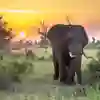
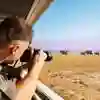
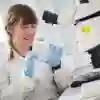
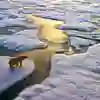
Where science meets conservation: protecting species, restoring ecosystems at the University of Hull.
The demand for change has never been greater. Join a programme designed to equip you with the skills needed to tackle today's urgent conservation challenges. Stand out to future employers by mastering not only ecological principles but also the socio-political dynamics shaping global conservation efforts, and gain hands-on experience with a two-week international field trip to Kruger National Park, South Africa.
On this course, you’ll learn cutting-edge conservation theory, data analysis, biodiversity monitoring, and the socio-political frameworks crucial to tackling global issues like poaching, human-wildlife conflict, and conservation economics.
About this course
In this programme, you'll not only develop essential wildlife conservation skills like designing biodiversity monitoring schemes, study design, and understanding environmental threats, but also address the critical socio-political aspects of conservation that employers are urgently seeking.
You’ll gain a deeper understanding of how wildlife conservation operates within human communities, the challenges this creates, and the impact of these social dynamics. Additionally, you'll explore the national and international legal and policy frameworks that shape and regulate conservation efforts globally.
You'll gain deep insight into many areas, with modules on global conservation, biodiversity and assessment, ecological monitoring and more. You'll also increase both your quantitative and qualitative research skills using industry standard software and techniques to prepare you for the life of work, and get hands on experience with field trips to South Africa.
Using these enhanced knowledge and research skills, you'll undertake the wildlife conservation project. With assistance you will conduct an individual research project or dissertation on a subject of your choosing, with the option to participate in existing real-life research projects or industry placements. This may include developing a detailed conservation plan for a particular species or habitat, a report on public opinion of a controversial conservation topic, developing a population viability model, or many other ideas. This project will tailor your degree to your passion, sending you into your career prepared to take on anything.

A day in the life at Hull
2 mins
Module options
For a full Masters degree, you'll study 180 credits over the duration of your course. Some programmes offer a Postgraduate Diploma (PGDip) qualification or a Postgraduate Certificate (PGCert) qualification. For a PGDip, you'll study 120 credits, and for a PGCert, you'll study 60 credits.
Filters
Wildlife Conservation Project
The project involves a desk/archive-based, data analysis, lab or field project and written project report on a subject agreed between the student and staff in a field relevant to wildlife conservation. Each student conducts, with assistance, an individual research project or dissertation, which is supervised for the duration of the project by an expert or experts in their respective field(s). The subject will be chosen in T2 and students will submit an initial literature review which will go on to form part of the dissertation at the beginning of T3. There may be opportunities to participate in existing research projects and/or have a placement with an external organisation. Some projects may consist of a series of related studies using different techniques that form chapters in a dissertation.
core
60 credits
Global Conservation
This module will give students an understanding of how conservation operates from a global to a national scale, including the roles of international bodies, legal and advisory frameworks and NGOs. Students will learn how these cascade into national level frameworks and legislation, and the benefits and drawbacks of these approaches.
compulsory
20 credits
Research Skills in Environmental Sciences
It is more important than ever that future environmental scientists are well-equipped with the skills needed to critically assess environmental research. This module will provide you with the key skills required to assess and integrate contemporary literature and to analyse and interpret complex data to become an independent researcher.
compulsory
20 credits
Biodiversity and Assessment
This module will address the various methods used for making assessments of populations and communities of organisms and of habitats for conservation work. Students will also learn the important data analysis techniques necessary to draw inference from such data, and how this can lead into evidence-based conservation planning and monitoring.
compulsory
20 credits
Ecology for Conservation
This module will deal with ecological principles at both the population and community level. The important theoretical foundations of the subject will be covered, allowing further exploration of how these lead into practical conservation issues and will deal with ecological principles at both population and community level. The important theoretical foundations of the subject will be covered, allowing further exploration of how these lead into practical conservation issues.
compulsory
20 credits
People and Conservation
Wild animals often live in close proximity to people, and conservation of those animals has important impacts on those people. This module will introduce a series of important topics associated with conservation and society, including a consideration of how successful conservation programmes can be designed in collaboration with local people rather than in conflict with them.
compulsory
20 credits
Biodiversity and conservation field course: South Africa
This module will be taught as a two-week field course based in the Kruger National Park in South Africa and taught with researchers from South African National Parks (SANParks) and allied organisations. Content will include:
- Field exercises learning biodiversity and behavioural monitoring techniques in the KNP
- Assisting researchers with biodiversity assessments for existing long-term monitoring projects in the KNP and the surrounding area (e.g. the SAEON Ndlovu node)
- The history of colonialism and Apartheid in South Africa and how this has created the current conservation landscape
- Inclusive community solutions to local conservation problems
compulsory
20 credits
Our academics
This programme is taught by environmental experts and world-leading scientists from the Biological Science and Environmental Sciences.

Professor Robert Knell
Professor of Zoology
Rob is a Professor of Zoology and an active researcher with interests in a variety of different aspects of ecology and evolution, mainly to do with either parasites, immune systems, sex or all three.

Dr Charlotte Hopkins
Senior Lecturer
Charlotte's current research includes understanding human perceptions of the marine environment and how these can be incorporated into conservation, planning, marine management and sustainable use.
Entry Requirements
What do I need?
When it comes to applying for this Postgraduate Taught degree, you'll need an Undergraduate degree (or equivalent). For this course, you'll need a 2:1 from a relevant bachelor's degree.
The programme is designed for graduates who have studied a subject that is relevant to this course.
If you’re an undergraduate student at Hull, you’re guaranteed a fast-track route to this postgraduate degree, as long as you meet the entry requirements.
In order to ensure our students have a rich learning and student experience, most of our programmes have a mix of domestic and international students. We reserve the right to close applications early to either group if application volumes suggest that this blend cannot be achieved.
Typical offer
2:1 in a relevant subject area
At Hull, we request an entry grade tariff of 2:1 in a related field, or 2:2 with relevant experience reflecting the nature of the program. Conservation is a multidisciplinary field and a wide range of undergraduate degrees will be considered, including biology, zoology, ecology, environmental science and geography.
Well-qualified graduates from other programmes such as politics, sociology or law with relevant experience in the field would also be considered.
Fees & Funding
How much is it?
Tuition fees for 2027 entry have not been confirmed. Please use 2026-27 information as a guide.
Scholarships
We offer a number of awards, bursaries and scholarships for eligible students. They’re awarded for a variety of reasons including academic achievement and/or to help those on lower incomes.
Scholarships and bursaries are separate to student loans. And the best bit is, you don’t pay a penny back.
Alumni Postgraduate Scholarship
University of Hull undergraduates progressing to a taught masters course may receive a 20% discount on the cost of their tuition fees.
Find out if you’re eligible by visiting the University of Hull Alumni Postgraduate Scholarship page.
See more Scholarships
We offer a range of scholarships and awards to students at the university to help with their financial load.
To view all of our scholarships and determine whether you're eligible, please visit our Scholarships and Awards page.
Our Facilities
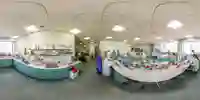

Future prospects
There is a global need for well-trained conservation professionals who are able not only to understand the underlying ecological and management principles of conservation but also to work in the socio-political environment that all conservation work is embedded in. Graduates from this programme could work in a range of careers such as as a:
Conservation Scientist, Ecologist, Wildlife Biologist, Environmental Consultant, Habitat Restoration Specialist, Academic Researcher and, moving beyond the sector, in many business, governmental or NGO roles.
Take your career to the next level
Like what you’ve seen? Then it’s time to apply.
Make your application online now, and our admissions team will get back to you as soon as possible to make you an offer.
Not ready to apply yet?
We regularly deliver virtual and on-campus events to help you discover your perfect postgraduate course, whether it’s a subject you already love or something completely different. Our events are an opportunity for you to chat to tutors and current students and find out about the career options a postgraduate degree could lead to.
You may also be interested in...
All modules presented on this course page are subject to availability and this list may change at any time.